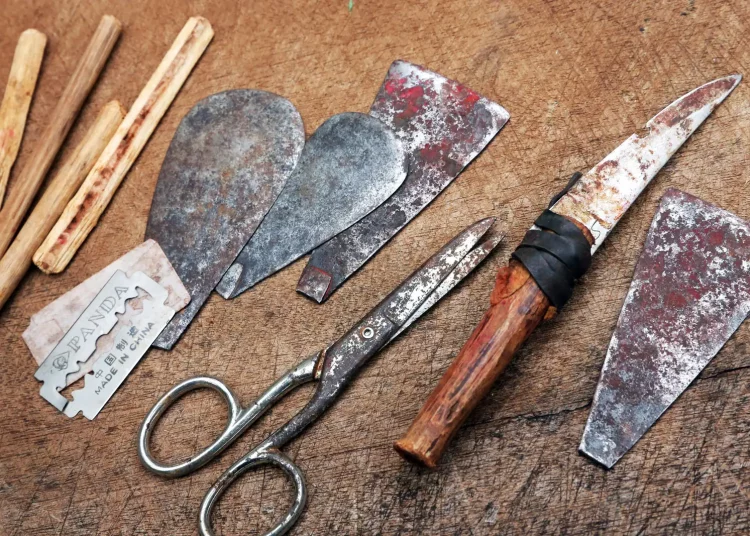In a bid to save girls and women from Female Genital Mutilation (FGM) related complications and protect their rights, the federal government, in collaboration with the United Nations Children’s Fund (UNICEF) and the United Nations Population Fund (UNFPA) recently launched a movement to end the practice of Female Genital Mutilation (FGM) in Nigeria.
The initiative, tagged „Movement for Good to End FGM“ targets to mobilise five million Nigerians to “Act to End FGM”.
Female genital mutilation is the partial or total removal of external female genitalia or other injury to the female genital organs for non-medical reasons.
According to UNICEF, FGM is a violation of girls’ and women’s fundamental human rights. The child’s rights organisation says that the practice has no health benefits and often leads to long-term physical and psychological consequences, adding that women who have undergone genital mutilation can experience complications during childbirth, including postpartum haemorrhage, stillbirth and early neonatal death.
UN resident and humanitarian coordinator in Nigeria, Mr. Matthias Schmale, who spoke during the launch in Abuja noted that the medicalisation of FGM in Nigeria remains a threat in states like Ekiti, Oyo and Osun.
He said although the prevalence has reduced, analysis of the data demonstrates a new pattern of mutilation through medicalisation is on the increase, adding that 86 per cent of these children were mutilated before the age of five, which means that the risk of FGM is greater at early years of life.
„What this tells us is that the perpetuators of this crime are devising a way to 8Ydiminish the gains made towards the eradication of FGM in Nigeria by targeting infants who don‘t know the magnitude of the practice they are being subjected to,“ he said.
The UN representative said there are no psychological of biological benefits from FGM, saying it is a practice which violate women and girls right to life, health and dignity, stressing that the time to end FGN in Nigeria is now and the responsibility to do so lies with us all.
„The movement we are launching today will support innovative and safe platforms driven by young people.
Also speaking at the event, the minister of women affairs, Dame Pauline Tallen, described FGM as a violation of human rights, which she said is deeply rooted in cultural beliefs and perceptions over decades and generations.
She said: “The procedure involves the partial or total removal of the external female genital causing injury to the female genital organs. In places where it is practiced it is seen as a rite of passage of a girl-child to womanhood and this is encouraged by family members in the fear and belief of societal sanctions.
“The mental and psychological agony attached with FGM is deemed the most serious complication because the problem does not manifest outwardly for help to be offered.”
Tallen noted that eliminating FGM is crucial to realising many of the other Sustainable Development Goals, (SDGs), including targets on health and well-being, quality education, gender equality, decent work and economic growth. “The continuous practice of FGM denies girls and women the right to quality education, opportunities for decent work and their health particularly sexual and reproductive are threatened,” she stated.
She lamented that despite the existence of laws in the country prohibiting this act, FGM has remained a common practice in the country.
The 1999 Constitution of the Federal Republic of Nigeria (as amended). Section 4 of the Constitution states ‘No person shall be subjected to any form of torture, inhuman or degrading treatment. ‘The Child Rights Acts 2003 in section 11B states that ‘No child shall be subjected to any form of torture, inhuman or degrading treatment.’ The Violence Against Persons Prohibition (VAPP) Act 2015 is indeed a viable weapon in this crusade. It recommends that ‘… a person who performs female circumcision or genital mutilation or engages another to carry out such, commits an offence punishable by 4 years imprisonment or to a fine of N200,000 or both.
However, available statistics show that Nigeria has the highest number of cases of FGM in the world accounting for about 115 million out of 130 million circumcised women worldwide. The South-South zone with 77 per cent among adult women has the highest prevalence practice in Nigeria, followed by the South East zone with 68 per cent and South West zone with 65 per cent.
Tallen noted that the culture has long been shrouded in silence, which makes it difficult for victims to speak for fear of stigmatisation. “We must together provide an enabling environment to support the victims through making FGM related support services free and increase the awareness on the health and social impact of these practices on our economy”, she urged.
The minister however expressed delight that the 34 States have domesticated the VAPP Act (2015), while 27 States have domesticated the Child Rights Act (2003). “We will therefore scale up our advocacy to these States to ensure compliance and push for more convictions to serve as a deterrent to others. We need to see implementation; we need to see more budgetary commitment to this cause at all levels,” she added.
We’ve got the edge. Get real-time reports, breaking scoops, and exclusive angles delivered straight to your phone. Don’t settle for stale news. Join LEADERSHIP NEWS on WhatsApp for 24/7 updates →
Join Our WhatsApp Channel










